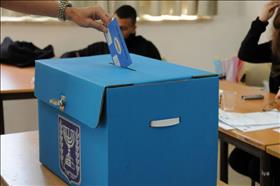What do we see through the lens of religion & state?
January 2020 Israeli Voice Index data analysis
Earlier this week, the Israel Democracy Institute’s important monthly survey was published: the Israeli Voice Index. Looking through the full data set and analyzing it provides additional insights, including in the field of religion and state, which support the findings of Hiddush’s regular public opinion surveys.
07/02/2020 01:31
Tags: Blue & White · Likud · religion & state · elections · Israel Democracy Institute

Israeli ballot box
First, it reaffirms the fundamentally different distribution among the Israeli public when it comes to religious views when compared to political views, as Hiddush highlighted in its 2019 Israel Religion and State Index. While about 65% of Israel’s adult Jewish public describe itself as secular or "traditional, non-religious," about 62% describe themselves as being politically right of center. By comparison, only about 12% identify themselves as being to left of center! Even among the secular public, only 23.5% position themselves to the left of center, while over 90% of the Zionist Orthodox public places itself right of center, as does about 78% of the ultra-Orthodox public.
The survey asked the question: "What do you think is the main issue that will affect the Israeli vote in the upcoming Knesset elections?" We would love to have asked another question, regarding which issue would affect the votes of the respondents themselves, for we are not convinced that the answer in both cases would be the same. However, there is also importance in the question as asked.
What, in your opinion, is the principle issue, which will impact
upon Israelis' votes in the upcoming Knesset elections?

The report published by IDI indicates the distribution of responses among the general population, as well as a comparison to a survey conducted in February 2019, about a month and a half before the April elections. The report released this week does not differentiate between the Jewish and Arab sectors’ answers and indicates a significant change in the answers between the previous survey and the current survey in that the import of Netanyahu's investigations rises to first place, from 19% in February to 32%. The issue of security drops from first place [30%] to third place [17.7%], and the cost of living and housing costs remains similar [21-22%]. Religious and state issues are only in fourth place in this survey.
Assuming that the large gaps between the answers in these two surveys reflect a real change in public attitude, there is a special interest in trying to dig a little deeper in understanding the findings, based on the raw data. [Doubt arises for us in light of the fact that the current poll indicates that 31.3% of Israelis intend to vote for Blue & White, compared to only 21.1% who intend to vote for Likud. That's a big gap, which is not reflected in many other polls, and if it is accurate - this will, of course, have the most far-reaching consequences].
It is precisely in matters of religion and state that the parties’ positions differ significantly and the positions of Blue & White are closer to the positions of the majority of the Jewish public, especially the secular and traditional non-religious public.
First, it is interesting to see that among the Jewish public, the importance of Netanyahu's investigations increased from 20% to 34.1%, and that Blue & White voters attach double importance to this, in comparison to Likud voters. However, the importance of religion-state relations is still significantly higher for the Jewish public than Jewish-Arab relations [12% compared to only 4.3%]; and the gap is even greater among the secular public: 11.6% compared to only 2.6%! For the secular public, secular-religious relations are nearly as important as security issues and the cost of living [about 12% compared to about 16%].
This is of great importance in light of the fact that Blue & White does not seem to have been able to present a compelling alternative vision of security and economy to the ruling Likud party, as their positions on these issues are seemingly close. On the other hand, it is precisely in matters of religion and state that the parties’ positions differ significantly and the positions of Blue & White are closer to the positions of the majority of the Jewish public, especially the secular and traditional non-religious public. There was room to expect that Blue & White would highlight this difference, but at this point the party seems to be mostly building upon its position as the primary alternative to the Likud, which is quite natural, given the Likud positions regarding Netanyahu's indictments.
The question is whether, given the distribution of the Jewish public, and given that Netanyahu is perceived to have an advantage over Gantz when it comes to managing relations with the United States regarding the "Deal of the Century," an electoral campaign on this issue will be enough to decide the election. Hiddush remains of the opinion that for most of the Israeli public, particularly the secular and traditional non-religious majority, issues of religious freedom and equality have significant political potential and have yet to be fully exploited to influence the elections.
According to the current survey, and as we have previously illustrated in recent Hiddush surveys, Blue & White voters are mostly secular [69.5%] or traditional-non-religious [23%]: that’s a total of 92.5%! The question is to what extent the leaders of Blue & White understand this and translate it into campaign language. It is clear that Yisrael Beitinu and its leader MK Avigdor Lieberman remain consistent and continue to highlight the "winning card" of religious freedom, which proved itself in the September elections. However, Blue & White has yet to realized this issue’s importance.